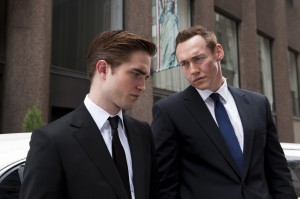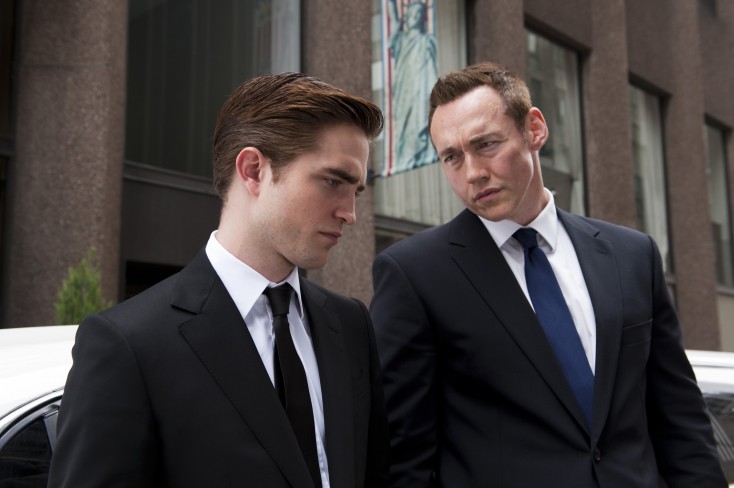
Wealthy Eric Packer (Robert Pattinson) and his chief of security (Kevin Durand) prepare to take a fateful limo ride © 2012 Entertainment One
By JAMES DAWSON
Front Row Features Film Critic
“Twilight” heartthrob Robert Pattinson takes a short, strange trip in the fitfully interesting if often gridlock-slow “Cosmopolis,” spending most of the movie in the back of a luxurious Manhattan-traversing limo. Director David Cronenberg, who adapted the screenplay from Don DeLillo’s novel, keeps things so flatly detached that the stagey proceedings occasionally change lanes from deliciously dry to deadly dull. Some intriguing supporting characters and a couple of sharp turns lead to unexpected territory, but it’s hard not to wish the movie would get out of first gear.
Dead-eyed billionaire currency speculator Eric Packer (Pattinson) is the kind of decadently jaded philistine who wants to install both the Rothko Chapel and a shooting range in his apartment. He tells his driver to take him crosstown for a haircut, refusing to be dissuaded by the traffic-jamming facts that the president is in the city and a massive funeral procession for a dead rapper is taking place. There’s also the matter of a credible threat against Packer’s life that has his chief of security (an icy Kevin Durand) more than casually concerned.
Pattinson is good at portraying Packer as so coolly bored with the world that he completely ignores anarchists who attack his limo, and doesn’t flinch when a sniper opens fire. His annoyance at not getting enough sex from his new wife Elise (Sarah Gadon) seems more reflexive than genuinely resentful, and his extra-marital trysts with other women during the course of his all-day journey are energetic but emotionless. While the massive losses that he incurs because of fluctuations in the value of the Chinese yuan certainly don’t improve his mood, he’s already well on the way to existential despair. His road trip becomes a kind of passive suicide attempt and reckless farewell tour.
Packer’s sleepy-eyed one-percenter ennui ultimately becomes tiresome, however, and not merely because it has become harder than ever to sympathize with poor little rich boys who realize money can’t buy happiness. His wife does audiences the favor of mocking Packer’s cliché claim that losing his fortune might make him free. “Free to do what?” she asks, “Go broke and die?”
An unexpected act of violence feels like Cronenberg’s attempt to jolt audiences awake, but a later 22-minute showdown featuring Paul Giamatti as the voice of the economically dispossessed is excruciatingly endless.
The most fascinating of several passengers who join Packer for short segments of his trip is financial theorist Vija Kinsky, played with a paradoxical mixture of can’t-look-away intensity and robotic aloofness by Samantha Morton. She makes professorial pronouncements about time as a corporate asset and wealth becoming its own end sound chillingly timely. After matter of factly stating that “the more visionary the idea, the more people it leaves behind,” she sums up her unimpressed disdain for a self-immolating protester by noting that his act is “not original.”
Other briefly seen Packer associates include Juliette Binoche as a shamelessly sexual art dealer, Jay Baruchel as a tech nerd and Abdul Ayoola as Packer’s torture-scarred driver who knows where limos go at night.
Even with its flaws, “Cosmopolis” works as a damning metaphor for capitalism’s soul-destroying relentlessness that feels depressingly contemporary. Last century’s roguishly nasty “greed is good” Gordon Gekko has been replaced by a world-weary hypochondriac 28-year-old with an asymmetrical prostate, a soundproof car and a decommissioned Soviet bomber he keeps in Arizona. As the spray-painters and rat-flingers in the movie point out, a specter is haunting the world. Packer is one of the walking dead that specter left behind, determined to leave a good-looking corpse by getting what might be one last haircut.




